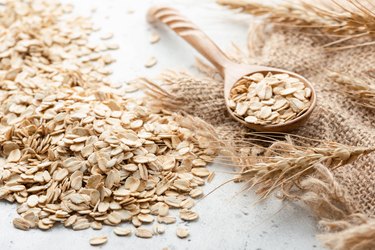
There was a time when doctors thought peptic ulcers were caused by stress and diet — but those days are long gone. Experts now know that peptic ulcers are most often caused by nonsteroidal anti-inflammatory drugs (NSAIDs) or a stomach infection from bacteria called Helicobacter pylori (H. pylori).
"Peptic ulcers are not caused by your diet," says Brooks Cash, MD, chief of gastroenterology at the University of Texas Health Science Center in Houston. "There are no foods that will cause a peptic ulcer or make a peptic ulcer go away. The days of prescribing a bland diet for ulcers are over. There is no specific ulcer diet."
Video of the Day
Video of the Day
Foods That Make Symptoms Worse
Peptic ulcers include ulcers that form in your stomach, called gastric ulcers, and ulcers that form at the beginning of your small intestine, called duodenal ulcers, explains the American College of Gastroenterology (ACG).
The word "peptic" refers to the digestive system and an ulcer is an open sore, so it would make sense that some foods would make pain from an open sore worse.
"Acidic foods don't cause ulcers, but they can aggravate the symptoms," says Dr. Cash. "Doctors used to prescribe milk and other dairy foods to sooth an ulcer, but today we know that calcium in milk actually increases stomach acid."
The GI Society and Physicians Committee for Responsible Medicine (PCRM) suggest avoiding these foods if you have an ulcer:
- Coffee: Both caffeinated and decaffeinated coffee can increase stomach acid.
- Alcohol: Alcohol can reduce some of the protective lining in your stomach and allow more acid to reach an ulcer. Alcohol may also delay healing of an ulcer.
- Spicy or citrus foods: There's no evidence that these foods make an ulcer worse, but some people may be more sensitive to them. The best advice is to avoid these foods if they bother you.
In addition, avoid smoking if you have an ulcer. Nicotine increases acid, and it also decreases blood supply to your stomach, which can delay healing of an ulcer, says PCRM.
Both organizations, in their suggestions for ulcer diets, also mention research suggesting benefits for some foods. These include:
- Fiber: A diet high in fiber may reduce your risk for ulcers. Foods that may help include oats, legumes, barley, nuts and fruits and vegetables, especially oranges, apples and carrots.
- Vitamin A: Foods high in vitamin A might also reduce the risk for ulcers. This finding is supported by some animal studies that found vitamin A increases the protective mucus barrier in the digestive tract, the GI Society notes. Sources of vitamin A include carrots, broccoli, sweet potatoes, kale, spinach and collard greens. Liver is also high in vitamin A.
- Flavonoids: There is some evidence that these plant nutrients may reduce gastritis, which is inflammation of the stomach. They include colorful vegetables and green tea. Flavonoids in tea might reduce H. pylori, the GI Society says.
There's no hard evidence that eating any of these foods will prevent you from getting a peptic ulcer, but fiber in fruits and vegetables is recommended for any healthy diet so you have nothing to lose.
What Can You Do?
Your diet won't help you get rid of your ulcer, but treatment will. According to ACG, the best way to get rid of a peptic ulcer is to visit your doctor and:
- Take an acid-lowering drug called a proton pump inhibitor (PPI).
- Find out if you have an H. pylori infection. If you do, you will need a full course of antibiotics along with acid-lowering medications.
- If you are taking an NSAID, try to get off it. If you need to take it, take it with a PPI.
Is this an emergency? If you are experiencing serious medical symptoms, please see the National Library of Medicine’s list of signs you need emergency medical attention or call 911.